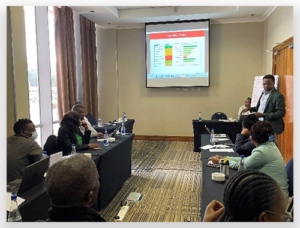Improving any system requires an understanding of how things function and being realistic about what is known and what is not before taking action. Since its launch in 2017, LabCoP has put assessment of laboratory systems and networks and evidence-based interventions at the core of its action.

Over the last six years, LabCoP has doubled from 11 to 22 countries, all provided with rigorous technical assistance to generate intelligence about their laboratory networks and systems. Between 2019 and 2022, LabCoP conducted 52 HIV viral load (VL) testing cascade assessments and four annual assessments in 11 countries, providing a unique overview of VL cascade improvements to achieve the third 95 of the UNAIDS 95-95-95 targets.
With support from Resolve to Saves Lives, four countries (Gabon, Burkina Faso, Cameroon and the Democratic Republic of Congo (DRC)) completed the ambitious LABNET score card assessment of the functionality of tiered laboratory networks across nine capabilities and against International Health Regulation and Universal Health Coverage targets. Each component of the scorecard receives a stage grading based on the capacity of each domain or component. This scoring method highlights the weaknesses and postulate that a single weak link compromises the functionality or capability of any system. Except for Gabon, three countries also conducted a follow-up LABNET assessment two years later. Notably, LABNET assessment data has been used to inform the laboratory component of DRC’s national action plan for health security. In November 2022, the LabCoP management team, country stakeholders and implementing partners met with Mr Cleophas Malaba, DRC’s Head of Health Laboratory Directorate, to discuss the LABNET assessment results that would inform joint planning of network improvements. Mozambique will undergo a LABNET assessment this October, with support from the Global Fund.

A complementary ASLM project, the Laboratory Mapping Program (LabMaP), provides countries with geographic information system (GIS) data on their laboratory systems to support evidence-based decision making, including diagnostic network optimization. LabMaP inventories laboratory locations, the range of diagnostic services and the populations covered. It also establishes sustainable in-country systems, ensuring access to the GIS data through local ministries of health. Eleven countries have or are collecting laboratory network GIS data as part of LabMaP.
Another important concept for laboratory systems is the integration of diagnostic services. This was at the core of the 2008 Maputo Declaration and recently prioritized again in the WHO AFRO Regional Strategy on Diagnostic and Laboratory Services and Systems (2023-2032). Integration is key to overcoming the siloed approach to laboratory networks and systems strengthening and to maximising efficiencies through sharing and optimal use of available resources. Seventeen countries have used the ASLM Integration Readiness Assessment Tool to determine whether their national systems were prepared to integrate diagnostic testing services from technology, human resource, data and programmatic perspectives. Preliminary data indicates that gaps still exist, notably related to insufficient workforce size, limited capacity for multitasking and fragmented data systems.
At the country level, results and recommendations derived from these assessments provide national stakeholders with crucial intelligence on laboratory networks and systems that can inform country strategies and/or funding requests. Accordingly, every year, LabCoP ensures technical assistance is provided to country teams, so assessment results are translated into prioritised activities in country action plans and strategies.
Internationally, ASLM’s key partners from the United States Centers for Disease Control and Prevention, PEPAFR and the Global Fund look to LabCoP-generated intelligence to adjust their priorities and create more opportunities for rational investments at the country level. Thus, the availability of various complementary assessments provides a cross-cutting, 360-degree perspective on the status of national laboratory systems, needed improvements and clear benchmarks against which to measure progress.
By the end of November 2023, LabCoP management intends to hand over a consolidated formal report of all assessments to country teams, heads of HIV and tuberculosis programmes, and relevant government officials to democratise intelligence on laboratory systems and mobilise stakeholders at the highest operational and policy level. This approach will encourage national consultative processes to take stock of results and jointly identify and prioritise key interventions to drive improvement.
At the LabCoP satellite session at ASLM2023, these reports will be shared, so countries can learn how to better summarise country-level data to make the knowledge gained more actionable.
Measuring is knowing. What gets measured gets done!

